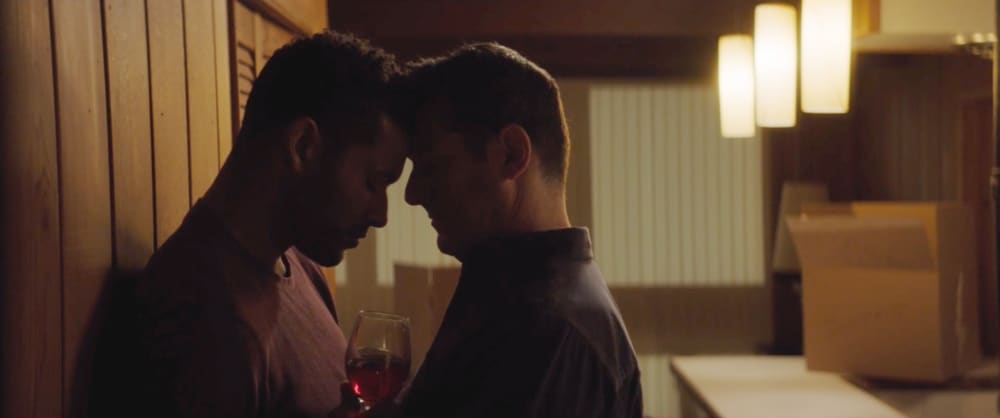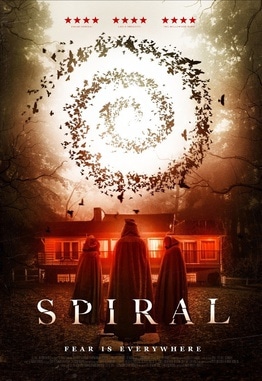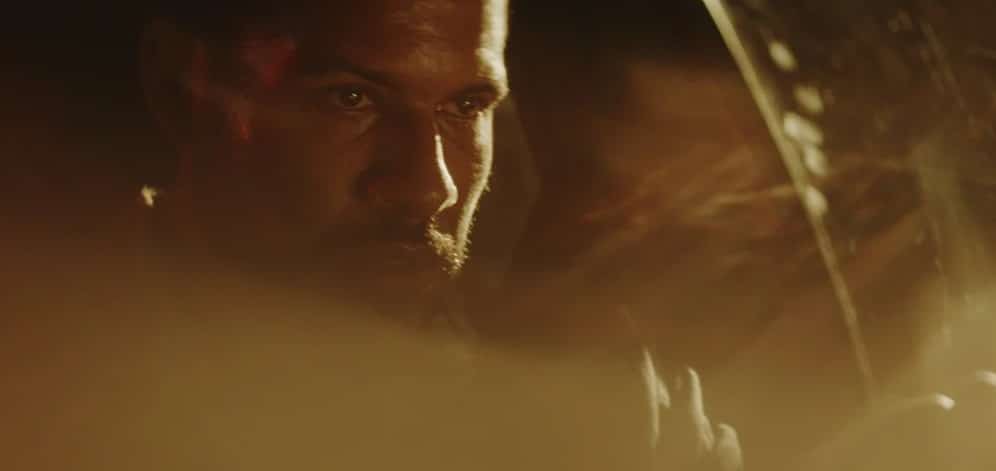
Malik (Jeffrey Bowyer-Chapman) is having an argument over the phone. His conversant assures him, “The world’s a different place. It’s not like it was back then.” Malik disagrees vehemently: “The world is exactly the same place it was back then. People don’t change, Liam. They just get better at hiding how they feel.” Indeed. Director Kurtis David Harder’s Spiral is an exceptional piece of social horror that lives out its protagonist’s words. The more things change, the more they stay the same.
The film opens in 1983, on a young, interracial gay couple making out in the back of a car. Quick cuts reveal headlights approaching, then one teen on the ground, bloodied, as the other screams for help, and then it’s 1995, and we meet Malik, owner of the flashback. He’s in the car with his partner, Aaron (Ari Cohen), and Aaron’s teenage daughter, Kayla (Jennifer Laporte), as they drive to their new home in Rusty Creek. Aaron has been yearning for a change of pace from city life, but judging by Malik’s flashback, he is more wary. He knows what evil may lurk behind the bucolic scenery of the countryside.
Danger, however, doesn’t always lurk or skulk. Homophobia is rampant in the United States, and writers Colin Minihan and John Poliquin carefully cultivate that national temperature as a backdrop to the events of Spiral. TV interviews with conservative thinkers play in the background, declaring that the traditional family unit is everything, and so-called scientists tout gay conversion therapies. At one point, Pat Buchanan’s 1992 “Culture War” speech issues from a car radio like a seeping poison. In it, he rails against homosexual rights, and warns, “It is not the kind of change America needs. It is not the kind of change America wants. And it is not the kind of change we can abide in a nation that we still call God’s country.”
Malik’s new home of Rusty Creek may well be the ‘God’s country’ of Buchanan’s speech. Tiffany, a chipper neighbor, pops over to offer a houseplant to welcome the new arrivals after she sees their “gardener working”. Of course, they don’t have a gardener; she has mistaken Malik for the help. When Aaron corrects her and introduces Malik as his partner, Tiffany momentarily stumbles before chirping, “Wow. That’s so exciting, we don’t have any of you in town.” In spite of her awful introduction, Tiffany seems to actually be pretty warm and accepting. She and her jovial heartlander husband, Marshal, are welcoming neighbors. They have drinks with Malik and Aaron at a party. They invite the couple over for dinner. They assert that “love is all that matters”. Marshal suggests that bigots are “assholes”. Has the world started to change? Or have people, like Tiffany and Marshal, just gotten better at hiding how they feel?

Unfortunately, Malik knows that “choosing to live your life loud and proud is about the bravest thing you can do in this world”. He understands how dangerous it is to be Black and gay in America, and even with the best intentions to make his new life work, he knows that he doesn’t have the luxury to ease into his surroundings without a healthy distrust. His worry, of course, is merited. People seem to be watching him; not just staring at the ‘other’, but actually keeping tabs on him. And someone broke into his house to spray-paint the word ‘faggot’ across his living room wall. Malik has every right to be concerned about his neighbors’ prejudices. And to make matters worse, he accidentally witnesses many of them performing a strange ritual in the house across the way…
By combining the terror of mysterious rituals with the horror of homophobia, Minihan and Poliquin have blended social horror and folk horror to fantastic effect. Much of folk horror’s appeal stems from the otherness of the rural community our protagonists are thrust into. In Spiral, they have seized on that theme and turned it on its head. The insular and foreign communities of folk horror films like The Wicker Man or Midsommar are replaced by a small-town hospitality that is so recognizable. The horror of being an outsider instead derives from a national climate of hostility and the contempt that hides just behind the smiles of one’s neighbors. As Malik, Jeffrey Bowyer-Chapman gives a standout performance as that outsider. He is a loving partner and father, and supremely likable, endearingly embracing Kayla as “booger” throughout the film. Still, he is haunted by his past. The trauma of his youth echoes to his present in many ways throughout the film, but none perhaps so tragic as how it has altered his worldview. He knows that the world has not changed, and he tries to protect his loved ones from that awful truth, beset by horrors both and mundane and otherworldly.
Although utilizing intolerance is a natural and frightening way to update the closed communities of folk horror, there are moments where the parallel threats of homophobia and the neighborhood’s more supernatural machinations seem to be thematically at odds with one another. Whenever rituals figure into a story, there is a tacit understanding between viewer and filmmaker that there is a logic to the process, and there were times in Spiral where competition between the dual horror narratives undercut that logic. The filmmakers certainly have a compelling story to tell; one with meaningful things to say, but there are times where it feels like they overreached, opted for a little more horror, and threw off their accounting. Nonetheless, Spiral is a great, tense thriller, elevated by a fantastic performance from Bowyer-Chapman and a message that is still sadly, painfully timely. Twenty-five years on, it often feels like the “world is the same place it was back then”. Still, some things have changed – the advent of social horror has expanded genre films’ reach as allegory for societal ills, and Spiral is a both powerhouse horror film and a welcome change.
Spiral released on the 17th September 2020 (UK).
